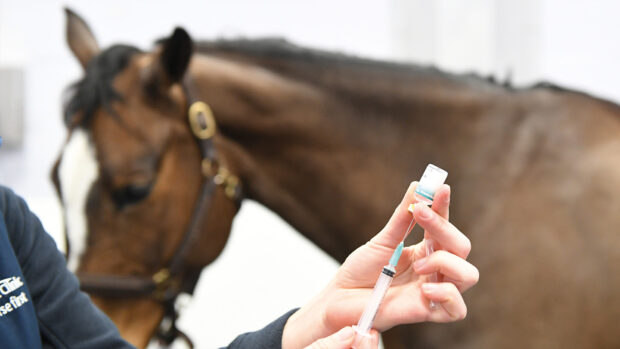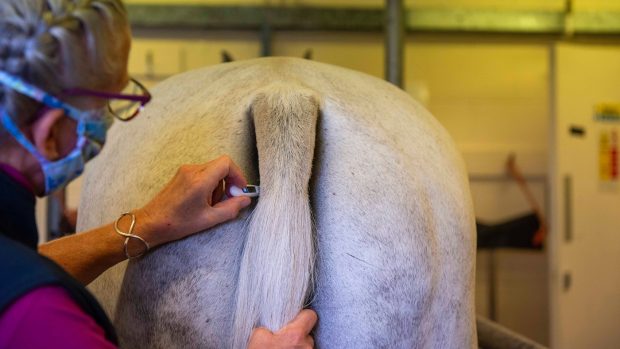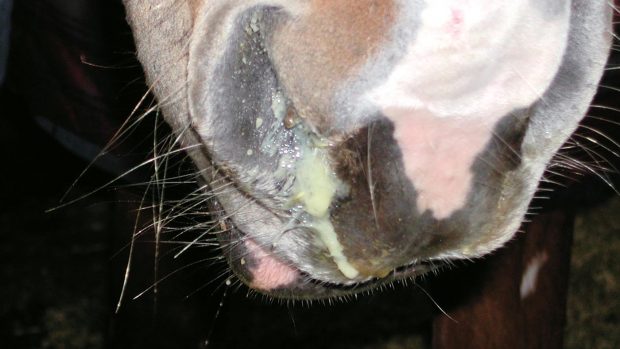Owners, riders and trainers are warned to be extra vigilant with biosecurity after several high-profile cases of strangles during the past few weeks.
Vets told H&H “anecdotally” there often “seems to be an increase in cases towards the end of winter”.
The highly contagious respiratory infection is spread easily by direct contact, or passed on through handling and contaminated equipment.
The incubation period varies from three to 14 days — but may be longer — and the disease is diagnosed through clinical signs together with swabs, scopes and blood tests.
Last week the owner of The Cabin EC in Aberdeenshire told H&H she was “devastated” after being forced to cancel all events in April following a strangles outbreak.
Fiona Quennell said she immediately called off all April shows — which included British Dressage and British Showjumping events.
“We had one case of strangles confirmed and immediately afterwards put the yard into temporary shut down. We have taken vets’ advice and can assure everyone we will not reopen until we are clear,” she said.
Continued below…

Sarah Jenkins: ‘those that speak up should be praised’
In light of a recent spate of strangles outbreaks, H&H's Content Director praises those that let others know they have
Strangles was also a focus of national media attention last week when an unnamed horse trained by Newmarket trainer Marco Botti returned from the Dubai World Cup Carnival with the infection.
The horse didn’t enter Mr Botti’s main yard, and was taken to a pre-training yard outside the town, which was placed into isolation.
It was the first reported case in Newmarket since 2009.
On 3 April the trainer said all horses had returned clear tests and they were able to “return to a normal routine”.
“We have high biosecurity measures in place. All staff are vigilant and we will continue to keep a close eye on all horses within the yard,” he added.
Although strangles is not a notifiable disease, if it is detected in racing yards trainers must report it to the British Horseracing Authority.
Newmarket Equine Hospital has reassured owners: “While there is no cause for alarm it is prudent for all owners to be vigilant for the clinical signs of the disease.”
Transparency is key
Although there can be a stigma surrounding strangles, vets and riders reiterate it is important to be transparent.
In February Redwings was forced to temporarily suspend rehoming after an outbreak at its Piggots site in South Norfolk.
It was the first time in 23 years there had been a case of strangles within the charity’s resident horses.
Redwings vet Nic de Brauwere said: “This just shows no system or test is 100% effective. We invest a lot of time and resources into our quarantine systems and so if we can get an unexpected case among our residents, it shows that anyone can.”
Later in the month (27 February) Bristol-based event rider Dani Evans told H&H she had temporarily shut down her yard after tests from Leaping Lord came back positive.
“Everyone has been amazing. Especially my owners, whose trust, patience and support has been second to none,” said Ms Evans.
Mr de Brauwere agreed that it is important for owners to be upfront: “It’s not notifiable, but it’s so prevalent that anyone suffering an outbreak should do the responsible thing and be open, then the spread can be brought to a halt.”
H&H vet Karen Coumbe added: “Quarantine for any new arrivals is always sensible, but this may not avoid the spread as some horses can be carriers with no clinical signs.
“Testing by your vet is the only way of detecting these cases — be careful and vigilant as it is a disease that is certainly best avoided.”
Ref: H&H 9 April, 2015




